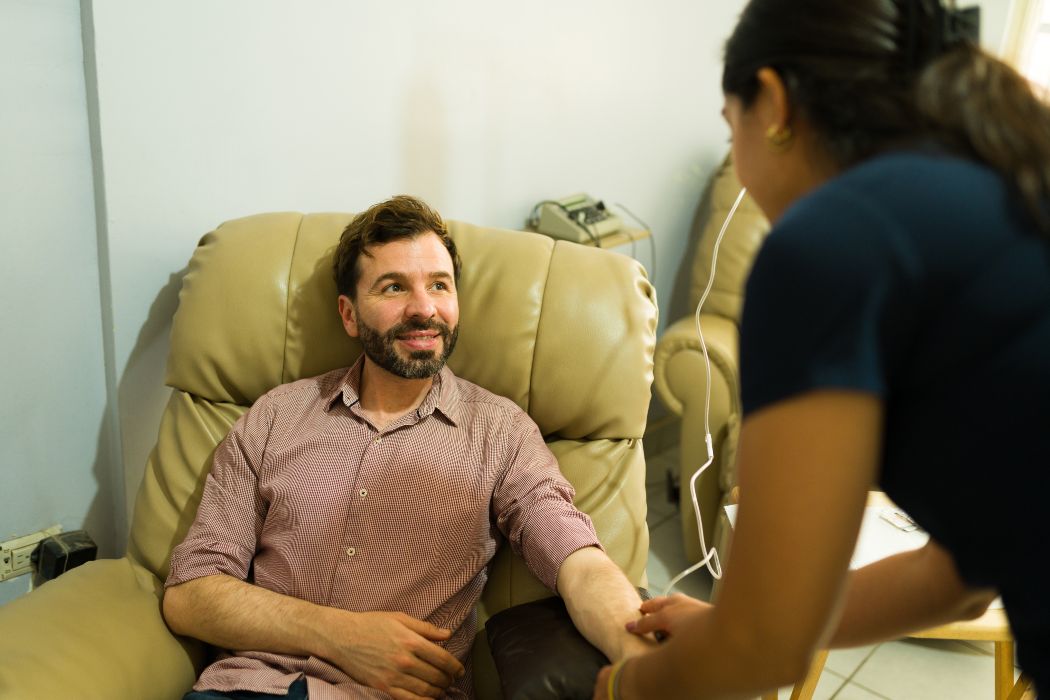Vitamin IV Therapy Pros and Cons: A Simple Breakdown of the Facts

When considering vitamin IV therapy, it’s essential to weigh the advantages and disadvantages. In this article, we will explore the pros and cons of vitamin IV therapy to help you decide if it’s the right choice for your health and wellness goals. By understanding both sides, you can make an informed decision about whether this treatment aligns with your needs.
What is Vitamin IV Therapy?
Vitamin IV therapy involves delivering essential nutrients directly into the bloodstream via an intravenous drip.
Unlike oral supplements, which must pass through the digestive system, vitamin IV therapy provides immediate absorption, offering a quicker and more effective way to get vitamins and minerals into your body.


The 9 Pros of Vitamin IV Therapy
1. Quick Nutrient Absorption
One of the key benefits of vitamin IV therapy is the fast absorption of nutrients. Unlike oral supplements, which must pass through the digestive system, IV therapy delivers vitamins directly to your bloodstream. This process bypasses digestion, ensuring that your body receives 100% of the nutrients quickly and efficiently.
2. Improves Specific Health Conditions
Vitamin IV therapy can help individuals with conditions like Crohn’s disease, ulcerative colitis, and cystic fibrosis, which often interfere with nutrient absorption. This method allows patients to receive the vitamins and minerals they need without causing digestive discomfort.
3. Promotes Cardiovascular Health
Certain IV infusions contain ingredients that support heart health, such as magnesium, calcium, and amino acids like arginine. These nutrients can help relax blood vessels, lower blood pressure, and improve overall cardiovascular function.
4. Boosts Energy Levels
If you’re seeking a natural energy boost, vitamin IV therapy could be the solution. B vitamins and amino acids delivered through IV therapy help increase energy levels without the crash associated with sugary drinks or caffeine.
5. Strengthens the Immune System
Vitamin IV therapy can deliver powerful antioxidants like vitamin C and zinc directly into the bloodstream. These antioxidants help to combat free radicals, reduce oxidative stress, and strengthen the immune system.
6. Supports Weight Loss
Certain vitamin IV infusions can promote weight loss by increasing metabolism and converting fat into energy. Nutrients like carnitine and alpha-lipoic acid are commonly used in weight loss IV drips to aid in breaking down fat cells.


7. Alleviates Hangover Symptoms
After a night of heavy drinking, vitamin IV therapy can quickly rehydrate your body and reduce the symptoms of a hangover. Infusions often contain electrolytes and vitamins that help replenish lost fluids and alleviate dizziness, nausea, and fatigue.
8. Speeds Up Wound Healing
The healing properties of vitamin C, zinc, and glutathione can help speed up wound recovery. These nutrients promote cell repair, support immune health, and improve skin quality, making IV therapy a great option for post-surgery recovery or injury rehabilitation.
9. Reduces Signs of Aging
Glutathione, a powerful antioxidant found in many IV drips, helps detox the liver, combat free radicals, and reduce signs of aging. Regular IV treatments may help improve skin elasticity and promote a youthful appearance.
The 3 Cons of Vitamin IV Therapy
Risk of Infection
As with any procedure that involves breaking the skin, there’s a slight risk of infection. However, when performed by licensed healthcare professionals in sterile conditions, this risk is minimal.
Bruising and Discomfort
Mild side effects like bruising or redness around the injection site are common, especially if it’s difficult to find a vein. Although this discomfort typically subsides within a few days, it’s something to consider if you’re sensitive to needles.
Potential for Pain
If you’re afraid of needles, the initial puncture might cause some pain. However, after the catheter is inserted, the discomfort usually fades. The sensation of the drip itself is generally painless.

Conclusion
In summary, vitamin IV therapy offers a variety of potential health benefits, from faster nutrient absorption to improved energy levels and cardiovascular health. It can also be an effective way to boost immunity, promote weight loss, and accelerate recovery from illness or surgery. However, it’s essential to be aware of the potential downsides, such as the small risk of infection, minor discomfort, and the possibility of bruising.
Frequently Asked Questions (FAQs)
Is vitamin IV therapy safe?
Yes, vitamin IV therapy is generally safe when administered by a licensed healthcare provider. They follow strict protocols to minimize risks such as infection or incorrect dosing.
How long does a vitamin IV therapy session last?
A typical session lasts between 30 to 60 minutes, depending on the type of infusion. You can often relax during the treatment, reading or using your phone.
How often should I get vitamin IV therapy?
The frequency depends on your health goals. Some people benefit from weekly treatments, while others may only need it monthly. Consult with a healthcare provider to determine the right plan for you.
Can anyone receive vitamin IV therapy?
Most people can receive vitamin IV therapy, but those with certain medical conditions, such as kidney disease or heart problems, should consult their doctor before starting treatment.
Does insurance cover vitamin IV therapy?
In most cases, vitamin IV therapy is considered an elective treatment and is not covered by insurance. Be sure to check with your provider for details on pricing.











